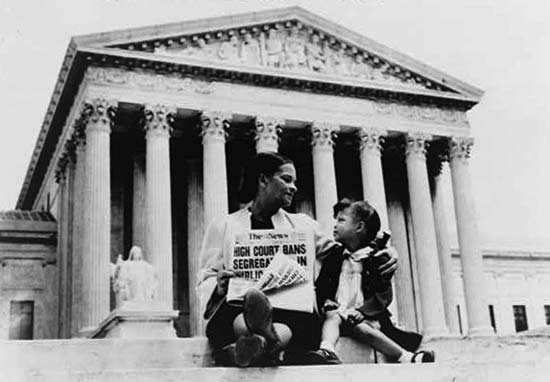Brown v. Board of Education of Topeka
law case
 case in which, on May 17, 1954, the U.S. Supreme Court (Supreme Court of the United States) ruled unanimously that racial segregation (segregation, racial) in public schools violated the Fourteenth Amendment to the Constitution (Constitution of the United States of America), which declares that no state may deny equal protection of the laws to any person within its jurisdiction. The decision declared that separate educational facilities were inherently unequal. Based on a series of Supreme Court cases argued between 1938 and 1950, Brown v. Board of Education of Topeka completed the reversal of Ferguson (Plessy v. Ferguson) (1896), which had permitted “separate but equal” public facilities. Strictly speaking, the 1954 decision was limited to the public schools, but it implied that segregation was not permissible in other public facilities.
case in which, on May 17, 1954, the U.S. Supreme Court (Supreme Court of the United States) ruled unanimously that racial segregation (segregation, racial) in public schools violated the Fourteenth Amendment to the Constitution (Constitution of the United States of America), which declares that no state may deny equal protection of the laws to any person within its jurisdiction. The decision declared that separate educational facilities were inherently unequal. Based on a series of Supreme Court cases argued between 1938 and 1950, Brown v. Board of Education of Topeka completed the reversal of Ferguson (Plessy v. Ferguson) (1896), which had permitted “separate but equal” public facilities. Strictly speaking, the 1954 decision was limited to the public schools, but it implied that segregation was not permissible in other public facilities.- siddur
- Side
- sideboard
- side-necked turtle
- sidereal period
- sidereal time
- siderite
- siderostat
- Sideroxylon
- Sidetic language
- sidewinder
- Sidgwick, Henry
- Sidgwick, Nevil Vincent
- Sidi Bel Abbès
- Sidi Bouzid
- Sid Luckman
- Sidmouth
- Sidmouth, Henry Addington, 1st Viscount
- Sidney
- Sidney, Algernon
- Sidney Altman
- Sidney and Beatrice Webb
- Sidney, Barone Sonnino
- Sidney Bechet
- Sidney Bradshaw Fay